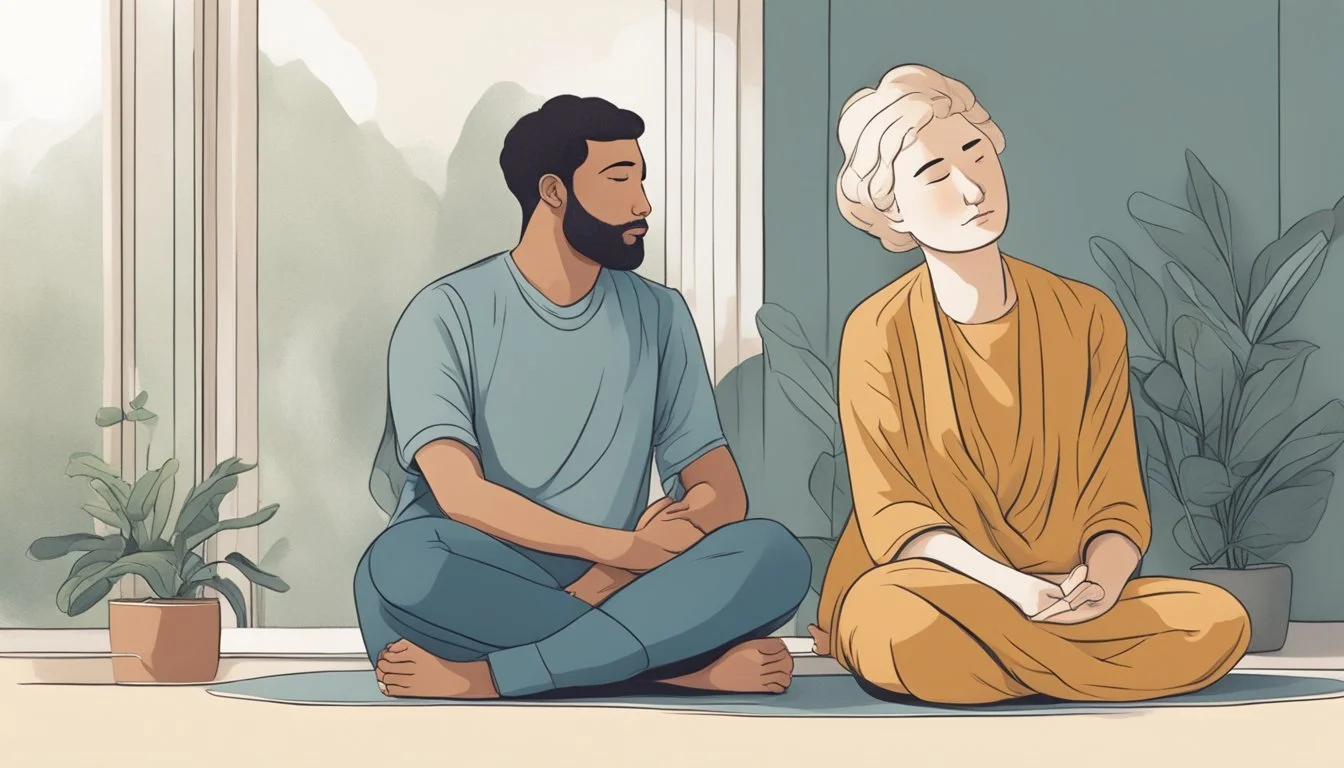Helping Your Partner Cope with Generalized Anxiety Disorder
Generalized Anxiety Disorder (GAD) can significantly impact relationships, particularly when one partner experiences persistent worry and fear. Living with a spouse who has GAD presents unique challenges that require understanding, patience, and support.
Partners can play a crucial role in helping their loved ones manage GAD symptoms and improve their overall quality of life. By learning effective strategies to provide support, couples can strengthen their bond and navigate the challenges of anxiety together. This article explores practical ways to assist a spouse with GAD while maintaining a healthy relationship.
1) Encourage Open Communication
Creating a safe space for honest dialogue is crucial when supporting a spouse with Generalized Anxiety Disorder (GAD). Partners should actively listen without judgment, allowing their loved one to express their thoughts and feelings freely.
Asking open-ended questions can help the anxious partner articulate their concerns. This approach demonstrates genuine interest and helps identify specific triggers or worries.
Validating emotions is essential, even if the anxious thoughts seem irrational. Acknowledging the spouse's feelings shows empathy and understanding, fostering a stronger connection.
Setting aside dedicated time for conversations about anxiety can be beneficial. This routine provides structure and predictability, which can be comforting for individuals with GAD.
Encouraging the anxious partner to share their coping strategies can empower them and strengthen the relationship. This knowledge allows the supporting spouse to offer appropriate assistance during difficult moments.
Clear and direct communication is key. Avoiding assumptions and seeking clarification helps prevent misunderstandings that could exacerbate anxiety.
2) Practice Mindfulness Together
Mindfulness can be a powerful tool for managing anxiety. Couples can support each other by engaging in mindfulness activities together.
Start with simple breathing exercises. Sit comfortably side by side and focus on slow, deep breaths. This can help calm racing thoughts and reduce physical tension.
Try guided meditations specifically designed for anxiety relief. Many apps and online resources offer these, allowing partners to follow along together.
Incorporate mindful walking into daily routines. Take short walks, paying attention to each step and the sensations of movement. This combines the benefits of physical activity with present-moment awareness.
Practice mindful listening during conversations. Give full attention to each other without judgment or interruption. This can improve communication and strengthen the relationship.
Explore mindful eating as a shared experience. Choose a meal to eat slowly, savoring each bite and discussing the flavors and textures. This encourages presence and can reduce stress around mealtimes.
3) Seek Professional Help
Encouraging a spouse with Generalized Anxiety Disorder (GAD) to seek professional help is crucial for their well-being. Therapy can provide valuable tools and strategies to manage anxiety symptoms effectively.
A mental health professional can offer specialized treatment options tailored to the individual's needs. Cognitive Behavioral Therapy (CBT) is often recommended for GAD, as it helps identify and change negative thought patterns.
Couples therapy may also be beneficial, addressing how anxiety affects the relationship. This can improve communication and mutual understanding between partners.
Supporting a spouse in finding a therapist can be helpful. Offer to assist in researching local mental health providers or compiling a list of potential therapists.
Medication might be recommended in some cases. A psychiatrist can assess whether anti-anxiety medications or antidepressants could be beneficial in conjunction with therapy.
Encourage open communication about the therapy process. Show interest in what they're learning and how it's helping, but respect their privacy if they prefer not to share details.
Remember that seeking help is a sign of strength, not weakness. Praise your spouse's courage in taking steps to manage their anxiety and improve their quality of life.
4) Create a Calm Environment
Establishing a peaceful atmosphere at home can significantly benefit a spouse with Generalized Anxiety Disorder (GAD). Reducing clutter and organizing living spaces helps minimize visual distractions that may trigger anxiety.
Soft lighting and soothing colors contribute to a relaxing ambiance. Consider using warm, neutral tones in decor and incorporating natural elements like plants or water features.
Minimizing noise pollution is crucial. Using sound-absorbing materials, such as curtains or carpets, can help create a quieter environment. White noise machines or calming background music may also prove beneficial.
Designating a specific relaxation area within the home provides a safe space for the spouse with GAD. This area can be equipped with comfortable seating, soft blankets, and calming activities like books or puzzles.
Maintaining a consistent routine and keeping shared spaces tidy can help reduce unexpected stressors. Regular cleaning and decluttering sessions contribute to a sense of control and order in the home environment.
5) Exercise Regularly
Regular physical activity can be a powerful tool for managing anxiety symptoms. Encouraging your spouse to exercise can help reduce stress and improve their overall well-being.
Consider suggesting activities you can do together, such as walking, jogging, or cycling. This not only promotes physical health but also provides an opportunity for quality time and bonding.
Yoga and tai chi are excellent options that combine gentle movement with mindfulness practices. These activities can help your spouse relax and focus on the present moment.
If your partner prefers solo workouts, support them by offering to watch the kids or handle household tasks during their exercise time. This shows your commitment to their mental health and self-care routine.
Remember that consistency is key. Help your spouse establish a regular exercise schedule that fits their preferences and lifestyle. Even short bursts of activity throughout the day can make a difference in managing anxiety symptoms.
Always consult with a healthcare provider before starting any new exercise regimen, especially if your spouse has any underlying health conditions.
6) Learn About GAD
Gaining knowledge about Generalized Anxiety Disorder (GAD) is crucial for supporting a spouse with this condition. GAD is characterized by persistent and excessive worry about various aspects of life, often without a specific cause.
Understanding the symptoms can help partners recognize when their spouse is experiencing anxiety. Common signs include restlessness, difficulty concentrating, irritability, and sleep disturbances.
Learning about GAD triggers can be beneficial. These may include work stress, financial concerns, health issues, or relationship problems. Recognizing these triggers can help partners provide better support during challenging times.
It's important to note that GAD is a chronic condition that requires ongoing management. Treatment options often include therapy, medication, or a combination of both. Familiarizing oneself with these approaches can help partners support their spouse's treatment plan.
Education about coping strategies is also valuable. These may include relaxation techniques, mindfulness practices, and lifestyle changes that can help manage anxiety symptoms.
By learning about GAD, partners can develop empathy and patience, which are essential for supporting a spouse with this disorder. This knowledge can also help reduce misunderstandings and improve communication within the relationship.
7) Avoid Triggers
Identifying and avoiding triggers can significantly help a spouse with generalized anxiety disorder. Common triggers may include certain places, situations, or even specific topics of conversation.
Once triggers are recognized, couples can work together to minimize exposure when possible. This might involve planning alternative routes to avoid anxiety-inducing locations or rescheduling activities during less stressful times.
For unavoidable triggers, partners can develop strategies to manage anxiety symptoms. Deep breathing exercises, grounding techniques, or brief relaxation practices can be helpful when facing necessary but challenging situations.
It's important to remember that completely eliminating all triggers is often unrealistic. Instead, the focus should be on gradually building coping skills and resilience. With time and practice, the anxious spouse may become better equipped to handle triggering situations.
Communication plays a key role in this process. Regular check-ins allow couples to discuss recent experiences and adjust their approach as needed. This collaborative effort can strengthen the relationship while supporting the spouse with anxiety.
8) Practice Patience
Supporting a spouse with Generalized Anxiety Disorder requires a great deal of patience. Anxiety is not something that can be quickly overcome, and progress may be slow at times.
It's important to remember that setbacks are common and part of the recovery process. Avoid showing frustration or disappointment when your partner struggles, as this can increase their anxiety.
Instead, offer consistent encouragement and praise for small victories. Recognize that your spouse is doing their best to manage their symptoms, even if it's not always apparent.
Be patient during anxiety-provoking situations. Allow your partner extra time to work through their feelings without rushing them or becoming impatient.
Understand that your spouse may need to repeat certain coping strategies or reassurances multiple times. Respond calmly and supportively each time, even if it feels repetitive.
Patience also means accepting that recovery is not linear. There may be good days and bad days. Maintain a long-term perspective and focus on overall progress rather than day-to-day fluctuations.
9) Limit Alcohol and Caffeine
Reducing alcohol and caffeine intake can significantly help manage generalized anxiety disorder symptoms in a spouse. These substances often exacerbate anxiety and interfere with sleep patterns.
Alcohol may initially seem to calm nerves, but it can worsen anxiety as its effects wear off. It can also disrupt sleep cycles, leading to increased irritability and stress the following day.
Caffeine, found in coffee, tea, and some sodas, is a stimulant that can increase heart rate and trigger anxiety-like symptoms. It may cause jitters, restlessness, and difficulty concentrating.
Encouraging a spouse to reduce or eliminate these substances can lead to more stable moods and improved sleep quality. Suggest alternative beverages like herbal teas or water.
Gradually reducing intake is often more effective than abrupt cessation. Support the spouse by joining them in limiting alcohol and caffeine consumption, making it a shared lifestyle change.
10) Support Medication Adherence
Medications can play a crucial role in managing generalized anxiety disorder. A supportive spouse can assist their partner in maintaining consistent medication use as prescribed by a healthcare provider.
This may involve helping to organize pills using a pill organizer or setting reminders for medication times. Spouses can also attend doctor appointments to better understand the prescribed regimen and potential side effects.
Encouraging open communication about medication experiences is important. If the partner notices any concerning side effects or changes in symptoms, the spouse can support them in discussing these with their doctor.
It's essential to avoid judgment or pressure regarding medication use. Some individuals may feel hesitant about taking psychiatric medications, and a spouse's non-judgmental support can be invaluable.
Spouses should remember that medication adjustments may be necessary over time. Patience and understanding during this process can help the partner feel supported in their treatment journey.
11) Establish a Routine
Creating a consistent daily routine can provide stability and structure for individuals with Generalized Anxiety Disorder (GAD). A predictable schedule helps reduce uncertainty, which is often a significant trigger for anxiety.
Encourage your spouse to set regular times for waking up, eating meals, working, exercising, and going to bed. This routine should include time for relaxation and self-care activities.
Incorporate anxiety management techniques into the daily schedule. This might include meditation, deep breathing exercises, or journaling at specific times each day.
Help your partner stick to the routine by offering gentle reminders and participating in shared activities together. Be flexible when necessary, as rigid adherence to schedules can sometimes increase stress.
A well-established routine can give your spouse a sense of control over their day, potentially reducing anxiety symptoms. It also provides a framework for gradually introducing new coping strategies and activities.
Understanding Generalized Anxiety Disorder
Generalized Anxiety Disorder (GAD) is a common mental health condition characterized by persistent and excessive worry about various aspects of life. It can significantly impact daily functioning and relationships, particularly with spouses or partners.
Symptoms and Diagnosis
GAD manifests through both psychological and physical symptoms. Common psychological signs include:
Constant worry about everyday matters
Difficulty controlling anxious thoughts
Restlessness or feeling on edge
Trouble concentrating
Physical symptoms often accompany these mental states:
Muscle tension
Sleep disturbances
Fatigue
Irritability
Diagnosis typically requires symptoms to persist for at least six months and cause significant distress or impairment in daily life. A mental health professional will conduct a thorough evaluation to rule out other conditions and assess the severity of symptoms.
Common Misconceptions
Many misconceptions surround GAD, leading to misunderstandings and stigma. One prevalent myth is that people with GAD can simply "snap out of it" or stop worrying at will. In reality, the disorder involves complex neurological processes beyond conscious control.
Another misconception is that GAD only affects mental well-being. However, the physical symptoms can be equally debilitating. Some people mistakenly believe GAD is a sign of weakness or a character flaw, when it's actually a legitimate medical condition requiring proper treatment and support.
It's also wrongly assumed that medication alone can cure GAD. While medication can be helpful, a comprehensive treatment approach often includes therapy, lifestyle changes, and support from loved ones.
Effective Communication Strategies
Clear and empathetic communication forms the foundation for supporting a spouse with Generalized Anxiety Disorder. Employing specific techniques can foster understanding and strengthen the relationship.
Active Listening Techniques
Active listening involves giving full attention to the anxious spouse and demonstrating genuine interest in their concerns. Maintain eye contact and use nonverbal cues like nodding to show engagement. Avoid interrupting or offering solutions prematurely. Instead, reflect back what you've heard to ensure understanding.
Ask open-ended questions to encourage your spouse to elaborate on their feelings. For example, "Can you tell me more about what's causing your worry right now?" This approach validates their experience and helps them feel heard.
Summarize key points to show you've been attentive. This can help your spouse feel understood and provide an opportunity for clarification if needed.
Supporting Without Enabling
While support is crucial, it's important to avoid inadvertently reinforcing anxious behaviors. Encourage your spouse to face their fears gradually rather than avoiding anxiety-provoking situations entirely.
Offer reassurance without dismissing their concerns. Statements like "I believe in you" or "We'll get through this together" can be more helpful than "Don't worry" or "It's not a big deal."
Collaborate on developing coping strategies. This might include relaxation techniques, mindfulness exercises, or challenging irrational thoughts. By working together, you empower your spouse to manage their anxiety independently.
Set boundaries to protect your own mental health. It's okay to take breaks or seek support for yourself when needed. This ensures you can continue to be a strong support system for your spouse long-term.





